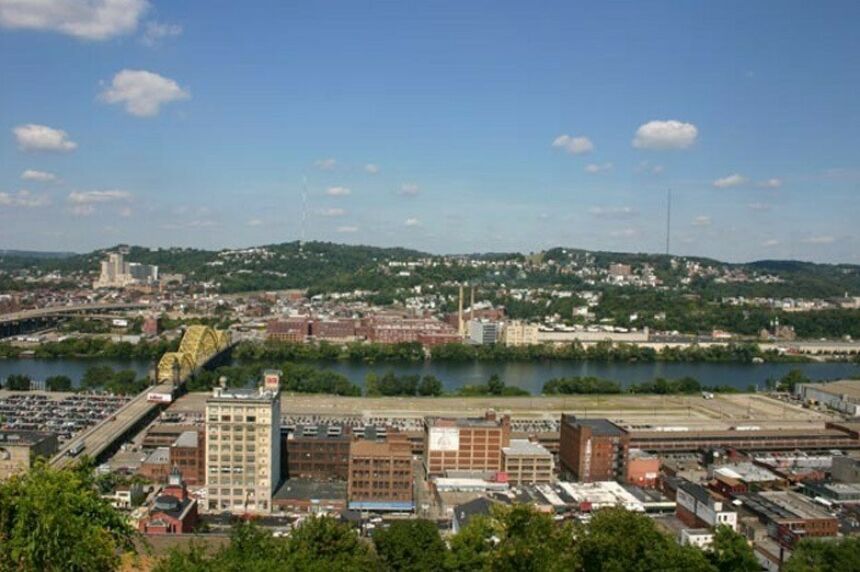April 25, 2022
Interdisciplinary research team receives IEE grant for urban forest research

UNIVERSITY PARK, Pa. – An interdisciplinary team led by Travis Flohr, assistant professor of landscape architecture in the Stuckeman School, was awarded a $30,000 through the Penn State Institutes of Energy and the Environment (IEE) Seed Grant program to further the study of urban forests.
The Stuckeman School is the largest academic unit in the College of Arts and Architecture at Penn State.
Titled "Connecting policies to actions for creating just, biodiverse, and climate-resilient urban forests,” the purpose of the project is threefold: to help rebuild urban forests and ecosystems that have been lost due the development of cities, to determine how to create climate-resilient forests and to fix the inequitable forest distribution in urban areas. The research will take place in Pittsburgh, which the pilot city for the study.
Along with Flohr, the team is comprised of experts from across multiple disciplines at Penn State, including Margaret C. Hoffman, assistant professor of plant sciences; Lilliard Richardson, professor of public policy and director of the School of Public Policy; Hong Wu, assistant professor of landscape architecture; and Justine Lindemann, assistant professor in community development and resilience.
Mehdi Heris, assistant professor of urban policy and planning at Hunter College, rounds out the research team.
According to Flohr, an interdisciplinary approach is vital to the study’s success due to the community engagement necessary, public policy issues and economic aspects of working with urban ecosystems.
“Each discipline this study involves has different rules, regulations and programs that interrelate with the environmental services that plants provide, but they also differ as to how they go about regulating development, installation and management,” he said. “A lot of that also deals with public policy, planning policy, economics and community involvement. We were looking for colleagues to fill that gap because it’s often a big barrier to success, and in our case, urban forests.”
The IEE funds will be used for graduate student tuition and stipends, student wages, research travel and focus group expenses, transcription of focus group data and supplies, which include maps, guidebooks for evaluating quality of trees, tablet and data collection devices, and digital cameras or audio recorders for focus groups.
The goal of the study is to develop a statistical model to identify how many trees of certain types survive and don’t survive, including how long they live, in a certain urban area. In addition, climate change modeling literature will be used to identify temperature, droughts, rainfall amounts and other weather conditions that impact tree survivability.
Two focus groups will be held to offer more information about the pilot city. One group will be made up of policymakers, planners, engineers, designers and other decision-makers in Pittsburgh to understand urban forest guidelines and funding, management, climate change and what trees are being planted in the city.
The second focus group will be with private landowners, renters and community members because urban forests on private land have different needs.
According to Flohr, this study will hopefully provide an outline for future tree programs, especially in terms of budgeting and design. The project can help the environment by providing healthier, quality, robust forests in addition to climate change resilience.
“We want to make sure these urban green spaces are resilient to climate change so that we are not only considering the urban conditions of now, but also thinking to the future and ensuring urban forests are equally distributed,” Flohr said.
The inspiration for the project stems from the negative environmental impacts of ecosystem loss in populated areas. With this project, a few barriers are at play.
One significant barrier is cost, not just of purchasing the trees, but also the cost of the land itself, the installation fees to ensure survivability, maintenance and care. According to Flohr, it also takes advocacy, which can be a barrier to those without the time, knowledge or socio-political power to move through the approval processes.
“If we’re going to leverage the services that plants – and specifically trees – provide, we have to set them up for success,” said Flohr. “To do that, there are certain design, planning and even ecological aspects that have to be put in place while also recognizing social and economic barriers.”
For more news from the Stuckeman School, follow us on Twitter @StuckemanNews.
